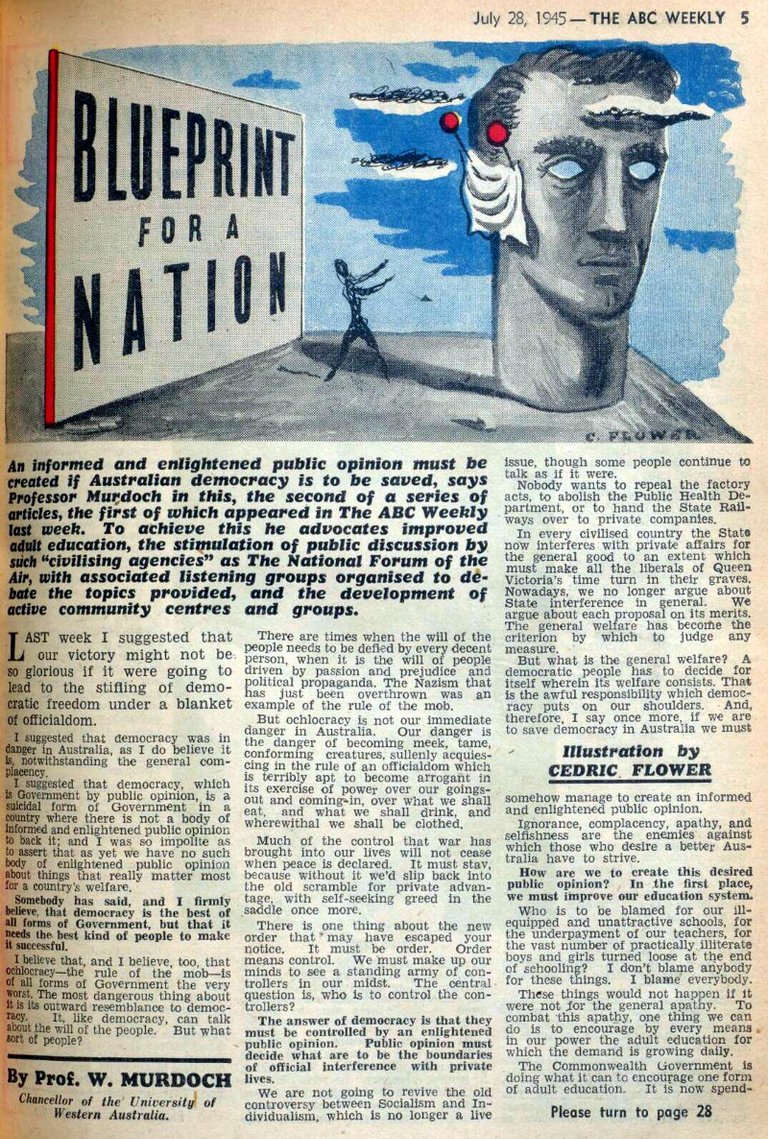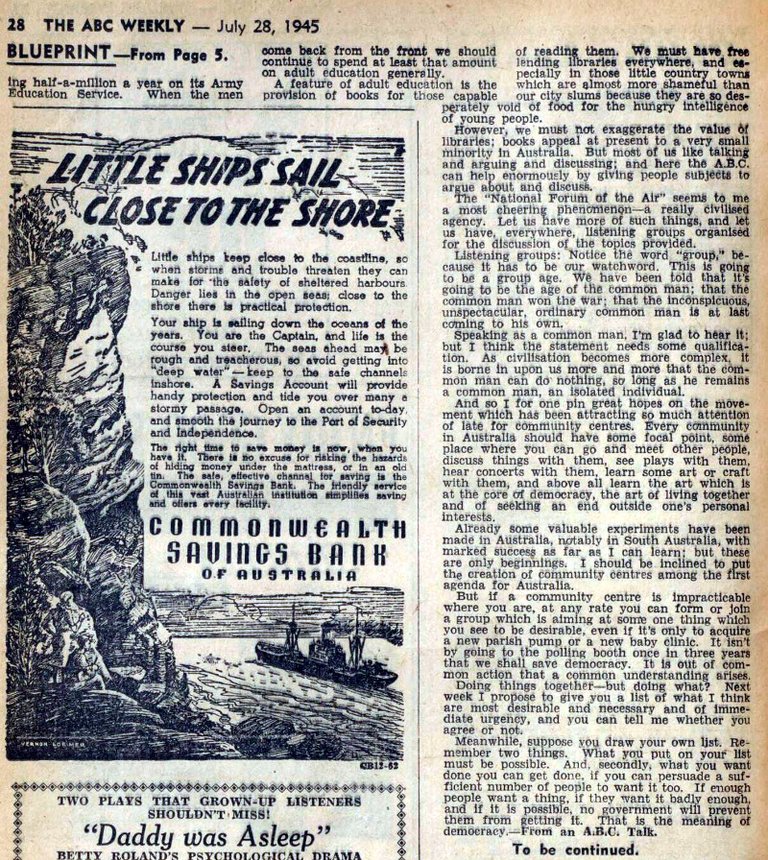Blueprint For A Nation by Prof. Walter Murdoch - 2nd Article
Blueprint For A Nation - Second article in The ABC Weekly, 1945
A series of three articles written by Professor W. Murdoch (Chancellor of the University of Western Australia) on the nature of Australia and its future relations to Democracy. These three articles and an introductory editorial were published in The ABC Weekly Journal way back in 1945.
- Blueprint For A Nation by Prof. Walter Murdoch - Editorial
- Blueprint For A Nation by Prof. Walter Murdoch - 1st Article
- Blueprint For A Nation by Prof. Walter Murdoch - 2nd Article
- Blueprint For A Nation by Prof. Walter Murdoch - 3rd Article

Blueprint For a Nation - Second Article
By Professor W. Murdoch (Chancellor of the University of Western Australia)
(July 28, 1945 - The ABC Weekly)
An informed and enlightened public opinion must be created if Australian democracy is to be saved, says Professor Murdoch in this, the second of a series of articles, the first of which appeared in The ABC Weekly last week. To achieve this he advocates improved adult education, the stimulation of public discussion by such "civilizing agencies" as The National Forum of the Air, with associated listening groups organized to debate the topics provided, and the development of active community centres and groups.
Last week I suggested that our victory might not be so glorious if it were going to lead to the stifling of democratic freedom under a blanket of officialdom.
I suggested that democracy was in danger in Australia, as I do believe it is, notwithstanding the general complacency.
I suggested that democracy, which is government by public opinion, is a suicidal form of Government in a country where there is not a body of informed and enlightened public opinion to back it: and I was so impolite as to assert that as yet we have no such body of enlightened public opinion about things that really matter most for a country’s welfare.
Somebody has said, and I firmly believe, that democracy is the best of all forms of Government, but that it needs the best kind of people to make it successful.
I believe that, and I believe, too, that ochlocracy — the rule of the mob — is of all forms of Government the very worst. The most dangerous thing about it is its outward resemblance to democracy. It, like democracy, can talk about the will of the people. But what sort of people?
There are times when the will of the people needs to be defied by every decent person, when it is the will of people driven by passion and prejudice and political propaganda. The Nazism that has just been overthrown was an example of the rule of the mob.
But ochlocracy is not our immediate danger in Australia. Our danger is the danger of becoming meek, tame, conforming creatures, sullenly acquiescing in the rule of an officialdom which is terribly apt to become arrogant in its exercise of power over our goings-out and coming-in, over what we shall eat, and what we shall drink, and wherewithal we shall be clothed,
Much of the control that war has brought into our lives will not cease when peace is declared. It must stay, because without it we’d slip back into the old scramble for private advantage, with self-seeking greed in the saddle once more.
There is one thing about the new order that may have escaped your notice. It must be order. Order means control. We must make up our minds to see a standing army of controllers in our midst. The central question is, who is to control the controllers?
The answer of democracy is that they must be controlled by an enlightened public opinion. Public opinion must decide what are to be the boundaries of official interference with private lives.
We are not going to revive the old controversy between Socialism and Individualism, which is no longer a live issue, though some people continue to
talk as if it were.
Nobody wants to repeal the factory acts, to abolish the Public Health Department, or to hand the State Railways over to private companies.
In every civilized country the State now interferes with private affairs for the general good to an extent which must make all the liberals of Queen Victoria’s time turn in their graves. Nowadays, we no longer argue about State interference in general. We argue about each proposal on its merits. The general welfare has become the criterion by which to judge any measure.
But what is the general welfare? A democratic people has to decide for itself wherein its welfare consists. That is the awful responsibility which democracy puts on our shoulders. And, therefore, I say once more, if we are to save democracy in Australia we must somehow manage to create an informed and enlightened public opinion.
Ignorance, complacency, apathy, and selfishness are the enemies against which those who desire a better Australia have to strive.
How are we to create this desired public opinion? In the first place, we must improve our education system.
Who is to be blamed for our ill-equipped and unattractive schools, for the underpayment of our teachers, for the vast number of practically illiterate boys and girls turned loose at the end of schooling? I don’t blame anybody for these things. I blame everybody.
These things would not happen if it were not for the general apathy. To combat this apathy, one thing we can do is to encourage by every means in our power the adult education for
which the demand is growing daily.

The Commonwealth Government is doing what it can to encourage one form of adult education. It is now spending half-a-million a year on its Army Education Service. When the men come back form the front we should continue to spend at least that amount on adult education generally.
A feature of adult education is the provision of books for those capable of reading them. We must have free lending libraries everywhere, and especially in those little country towns which are almost more shameful than our city slums because they are so desperately void of food for the hungry intelligence of young people.
However, we must not exaggerate the value of libraries; books appeal at present to a very small minority in Australia. But most of us like talking and arguing and discussing; and here the A.B.C. can help enormously by giving people subjects to argue about and discuss.
The “National Forum of the Air” seems to me a most cheering phenomenon — a really civilized agency. Let us have more of such things, and let us have, everywhere, listening groups organized for the discussion of the topics provided.
Listening groups: Notice the word “group,” because it has to be our watchword. This is to be a group age. We have been told that it's going to be the age of the common man; that the common man won the War; that the inconspicuous, unspectacular, ordinary common is at last coming to his own.
Speaking as a common man, I’m glad to hear it; but I think the statement needs some qualification. As civilisation becomes more complex, it is borne in upon us more and more that the common man can do nothing, so long as he remains a common man, an isolated individual.
And so I for one pin great hopes on the movement which has been attracting so much attention of late for community centres. Every community in Australia should have some focal point, some place where you can go and meet other people, discuss things with them, see plays with them, hear concerts with them, learn some art or craft with them, and above all learn the art which is at the core of democracy, the art of living together and of seeking an end outside one’s personal interests.
Already some valuable experiments have been made in Australia, notably in South Australia, with marked success as far as I can learn: but these are only beginnings. I should be inclined to put the creation of community centres among the first agenda for Australia.
But if a community centre is impracticable where you are, at any rate you can form or join a group which is aiming at some one thing which you see to be desirable, even if it’s only to acquire a new parish pump or a new baby clinic. It isn't by going to the polling booth once in three years that we shall save democracy. It is out of common action that a common understanding arises.
Doing things together — but doing what? Next week I propose to give you a list of what I think are most desirable and necessary and of immediate urgency, and you can tell me whether you agree or not.
Meanwhile, suppose you draw your own list. Remember two things. What you put on your list must be possible. And, secondly, what you want done you can get done, if you can persuade a sufficient number of people to want it too. If enough people want a thing, if they want it badly enough, and if it is possible, no government will prevent them from getting it. That is the meaning of democracy. —From an A.B.C. Talk.
(To be continued)